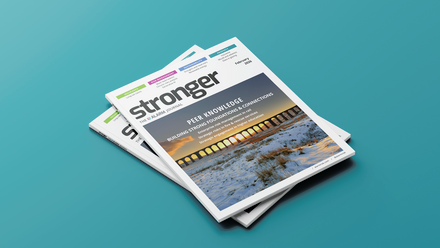Every organisation is reliant on their workforce to deliver their services or create products for their customers. The COVID-19 pandemic only highlighted the importance of a stable and quality workforce.
However, gaps in workforce resilience are appearing across the public and voluntary sectors.
Two of the key reasons why these gaps have arisen is the insufficient numbers of employees in the market and a lack of relevant skills for rapidly evolving roles.
With huge changes in the way people work, the ways in which we support, train and invest in our people must also evolve. It is not sustainable to continue with defunct ways of working, and an organisation which embraces new ways of working is better future proofed.
Resilient and sustainable organisations:
- Seize opportunities to ensure its workforce is trained in relevant ways to maintain ongoing employability and progression.
- Flex to accommodate individuals to meet business needs.
- Are inclusive.
- Have a happy and healthy workforce.
- Have the ability to attract and retain quality talent.
Effective recruitment and retention practices are a cornerstone of any organisation.
Tailoring your practices to your people
To ensure effective implementation of recruitment and retention practices, organisations should focus on developing strategies that are tailored to the individual needs of their business. This includes taking into consideration the culture, values and objectives of the organisation, as well as the skillsets of potential employees being recruited.
It is not only important that practices are tailored to the organisation itself, but also the customer base and the geographical areas in which the organisation operates. With more localised recruitment action plans, an organisation can reflect the community and better understand the best ways to advertise vacancies and attract people.
In the public and charity sectors your workforce is often part of your community. As employees and citizens, they are your local stakeholders and can bring real insight into community issues.
Karen Locke, President-Elect, ALARM
Viewing employees as people
Sustainable employment holds its foundations in an employee-centric philosophy - looking at the person in their entirety rather than solely their work persona.
Research shows that 82% of employees say it’s important for their organisation to see them as a person, not just an employee. Yet only 45% believe their organisation actually views them that way.
It is vital that organisations ensure they are providing a good work-life balance alongside flexibility, as well as health and wellbeing benefits and support. This can help to reduce stress and burnout, which can lead to increased retention rates.
Most organisations offer some form of mental wellbeing assistance programme for their employees, but all too often this doesn’t get to the core of the issue at hand. It is important that organisations have an open dialogue with employees to truly understand issues which arise, and ideally, prevent them before they boil over.
Zurich Municipal’s partner, Fika, has developed psychological interventions through technology, which tackle workplace behaviours that ultimately chip away at wellbeing. (Find out more about Fika at Dr Fran Longstaff’s Keynote to ALARM’s National Conference on Monday 3 July).
Retention through fulfilment
Organisations should focus on creating an environment that encourages employee engagement, satisfaction, and retention, particularly at a time when organisations are battling to attract and maintain staff levels and skillsets. This can be achieved through effective communication, training and development, and rewards and recognition programmes.
One way in which an organisation can effectively retain employees is through a focus on growth and opportunity. This doesn't have to centre on providing attractive compensation and benefits. It is equally important that employees feel a sense of purpose and direction.
When organisations promote a culture of team building and collaboration, alongside professional development opportunities, individuals are more likely to remain in the organisation and share its values.
Fostering a culture of feedback can also help create a positive work environment to encourage employees to grow in their roles, while further building trust with their employer. Regular check-ins with employees allow managers to identify areas of improvement, provide meaningful guidance and recognise accomplishments.
When employees can grow and develop in a safe and inclusive work environment, they feel more inclined to contribute to the success of the organisation.
A people strategy with a focus on workforce resilience and having a workforce that's competent, well developed and well looked after, is sustainability by stealth.
Karen Locke, President-Elect, ALARM
A sustainable workforce can thrive through creating a trusting and attractive working environment alongside a focus on professional development and instilling a sense of purpose for employees.
By building a workforce that is engaged and motivated, organisations can be better equipped to tackle future challenges. People will inevitably join and leave organisations for others, but utilising these strategies and re-evaluating practices holistically can help to improve recruitment strategies and increase loyalty and retention in the workplace.
Zurich Municipal’s latest whitepaper discusses key issues impacting our people – from the importance of workplace resilience to bringing our communities with us in the sustainability agenda.


